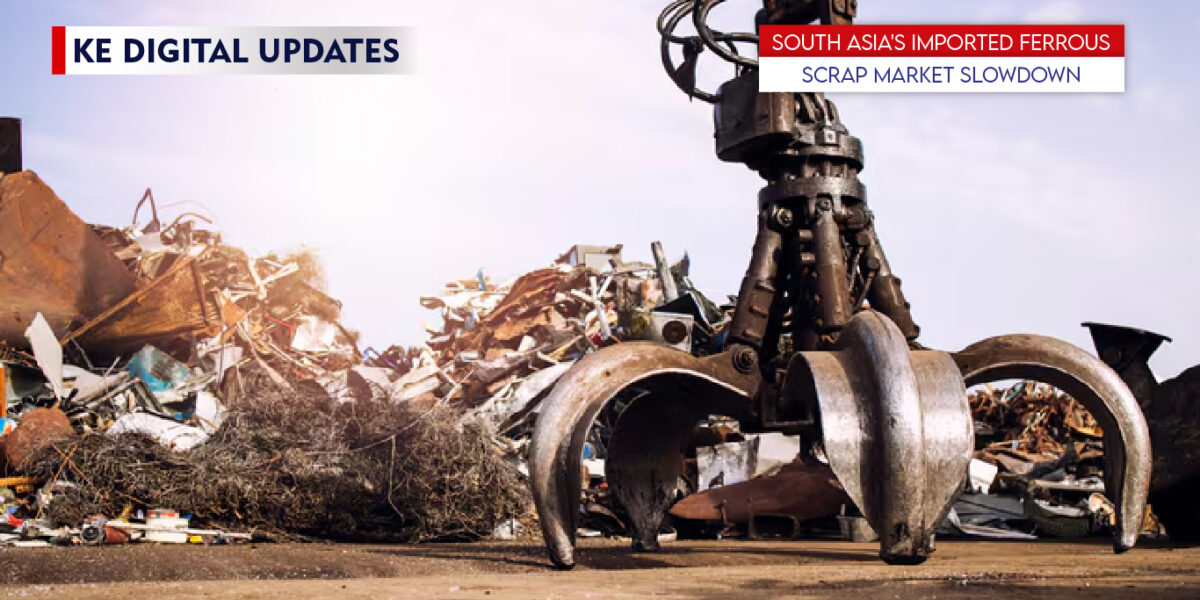Published on December 27, 2024
South Asia’s imported ferrous scrap market is experiencing a notable slowdown, influenced by seasonal lulls and economic pressures.
India
In India, the imported ferrous scrap market has entered a period of relative inactivity due to seasonal factors and year-end liquidity issues. As the holiday season sets in, many buyers have adopted a cautious stance, with several yards fully booked for January loadings. This has resulted in limited offers and stable price levels.
Indicative offers for UK/Europe and US-origin shredded scrap are currently priced at $385-390 per ton CFR Nhava Sheva. Meanwhile, HMS (80:20) from the UK is quoted at $365 per ton CFR, with buyer interest hovering around $360 per ton CFR.
A steel mill official mentioned, “We are offering discounts on rebars to clear inventory. We prefer sponge iron to scrap due to a cost advantage of INR 1,000 per ton for local material and INR 2,000 per ton for imported scrap.”
The market is expected to resume activity around early January, with yards preparing for February shipments. An EU-based supplier noted snowy conditions could delay operations until after the holiday.
Pakistan
Pakistan’s imported ferrous scrap market is similarly subdued, with minimal trading activity. The holiday mode and year-end liquidity constraints have dampened market sentiment, though prices have slightly increased.
UK-origin shredded scrap offers have remained firm at $390-393 per ton CFR Qasim, with UAE-origin HMS priced around $385 per ton CFR. Despite the firm pricing, trading volumes have been low. Domestic scrap prices are holding at PKR 137,000-140,000 per ton, while rebar is priced at PKR 240,000-245,000 per ton, reflecting weak demand and mills resorting to forced sales.
Market sentiment remains bearish, with mills operating at reduced capacities and buyers resisting higher offers. The market is expected to remain cautious in the near term due to seasonal factors and liquidity challenges.
Bangladesh
Challenges and Market Dynamics
Bangladesh’s imported ferrous scrap market is facing persistent challenges due to letter of credit (LC) delays, banking restrictions, and a rising dollar rate, which have led to constrained liquidity. Despite these hurdles, imported scrap prices have remained stable, supported by improved seasonal rebar demand.
In the domestic market, rebar prices have steadily risen, with rates at BDT 78,000-79,000 per ton ex-Dhaka. In Chattogram, mill quotes are around BDT 81,000-82,000 per ton. Local scrap prices have held firm, with HMS priced at BDT 50,000 per ton and PNS at BDT 52,000 per ton, as mills grapple with tight supply amid growing demand pressures.
Turkey
The Turkish imported scrap market has remained sluggish, with limited activity during the holiday season. Prices for US-origin HMS (80:20) edged down by $1 per ton to $349 per ton CFR, reflecting subdued demand and slow material flows.
A wide bid-offer spread characterizes the market, with Turkish mills targeting prices below $350 per ton CFR, while sellers aim higher due to the slow flow of materials. Mills have adopted a cautious approach as rebar demand has softened, and only those with low scrap inventories remain active. On the other hand, sellers are firm on their offers, expecting stronger mill demand post-holiday season.
Conclusion
The slowdown in the imported ferrous scrap market across South Asia and Turkey highlights the challenges posed by seasonal lulls and economic pressures. While India and Bangladesh have seen stable prices, Pakistan’s market remains slow with slight price increases, and Turkey experiences a sluggish market during the holiday season. As the new year approaches, market activity is expected to resume, bringing potential shifts in demand and pricing dynamics.


